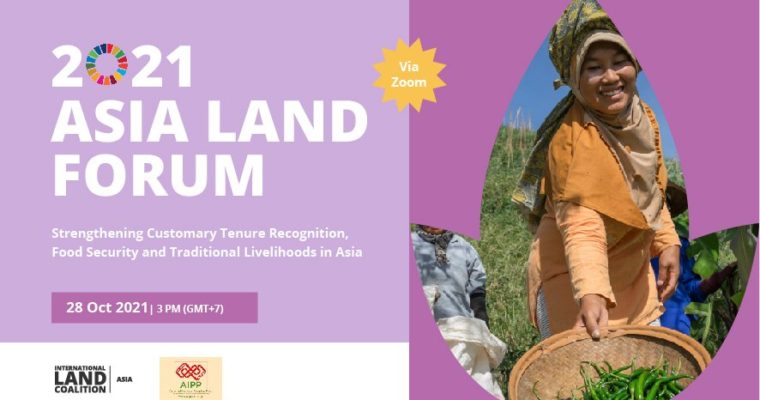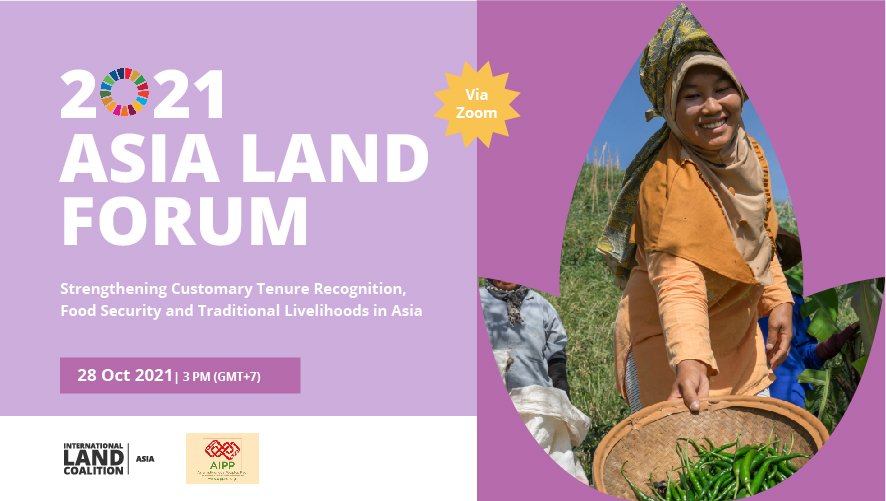Strengthening the linkages between customary tenure (CT) recognition, food security and traditional livelihoods in Asia
28 October 2021 | 3:00 PM Jakarta time
REGISTER
The State of the World’s Forest in 2018 underscored that clear and secured tenure rights are recognized as an important prerequisite for the sustainable management of natural resources. Tenure covers multiple rights, including at a minimum, the right to access, the right to make management decisions, and the right to withdraw resources from a particular area. Over the past few years, there has been progress in the areas of tenure and safeguards. Free, prior, and informed consent (FPIC) provisions under international and national laws, policies and programs have gained strength. Several legal reforms have been proposed, and in part adopted, in recent years on land in the region. Both CT and FPIC have been recognized as key indicators in an important guideline for responsible investment in food agriculture and forestry.
However, despite these developments, several challenges remain. For customary forest tenure, access and ownership are still conditional and restricted in several cases. Land conflicts remain high. Further cases of encroachments in customary land and forests threaten customary rights and impede traditional livelihood and customary conservation and resource management practices. In terms of safeguards, FPIC guidelines have not been developed and institutionalized in several countries, and many development projects such as dam construction, mining, and agroindustry crops are taking place without the consent of communities. The lack of capacity and awareness by the local communities and indigenous peoples on the international and regional mechanisms that provide safeguards over community rights limits their ability to engage authorities about the adherence to these safeguards.
This session will showcase the results of AFA’s study on the status of CT, food security, and traditional livelihoods in the ASEAN region, as well as the insights/ experiences of South Asian nations. The discussion and exchanges facilitated by the session will contribute to several ILC commitments including secure tenure rights (commitment 1); strong small-scale family farmers (commitment 2); secure territorial rights for IPs (commitment 5); locally managed ecosystems (commitment 6), among others. In addition, it will contribute to several SDGs such as eradicating poverty and hunger (goal 1); building a world of justice where human rights are protected (Goal 16), protecting the environment, and fighting climate change (Goal 13), among others.
Program Flow
| Time | Duration | Content | Speaker |
| 3:00 | 5 mins | Opening ceremony
|
Ma. Estrella Penunia, Secretary-General, AFA |
| 3:05 | 5 mins |
|
Myline Macabuhay, Coordinator for Land Rights, AFA |
| 3:10 | 10 mins | Presentation 1. Status of CT recognition, food security and traditional livelihoods in the ASEAN region | Maria Dolores Bernabe, Technical Consultant, AFA |
| 3:20 | 10 mins | Presentation 2. Status of CT recognition, food security and traditional livelihoods in South Asian | Dr. Baktear Hossain, Executive Director, SAC |
| 3:30 | 10 mins | Presentation 3. Insights on climate resilient indigenous food systems: A case study from Meghalaya, India | Bhogtoram Mawroh, Senior Associate, NESFAS |
| 3:40 | 5 mins | Panel commentary/ reactions.
|
Alfi Syakila, Head, AWG-SF (tbc) |
| 5 mins |
|
Anne Sophie Gindroz, SEA Regional Facilitator, RRI | |
| 5 mins |
|
Dazzle Labapis, Program Officer, NTFP-EP | |
| 5 mins |
|
Gam Shimray, Secretary General, AIPP
|
|
| 4:00 | 7 mins | Open Forum | |
| 4:07 | 7 mins | Summary of key takeaways
|
Irish Baguilat, Coordinator for Women’s Agenda and UNDFF, AFA |
| 4:14 | End of the session | ||
Moderator: Myline Macabuhay, Asian Farmers Association for Sustainable Rural Development
More information: https://asia.landcoalition.org/en/engage-ilc-asia/events-opportunities/2021-asia-land-forum-regional-assembly/asia-land-forum-2021-session-23/





Comments are closed